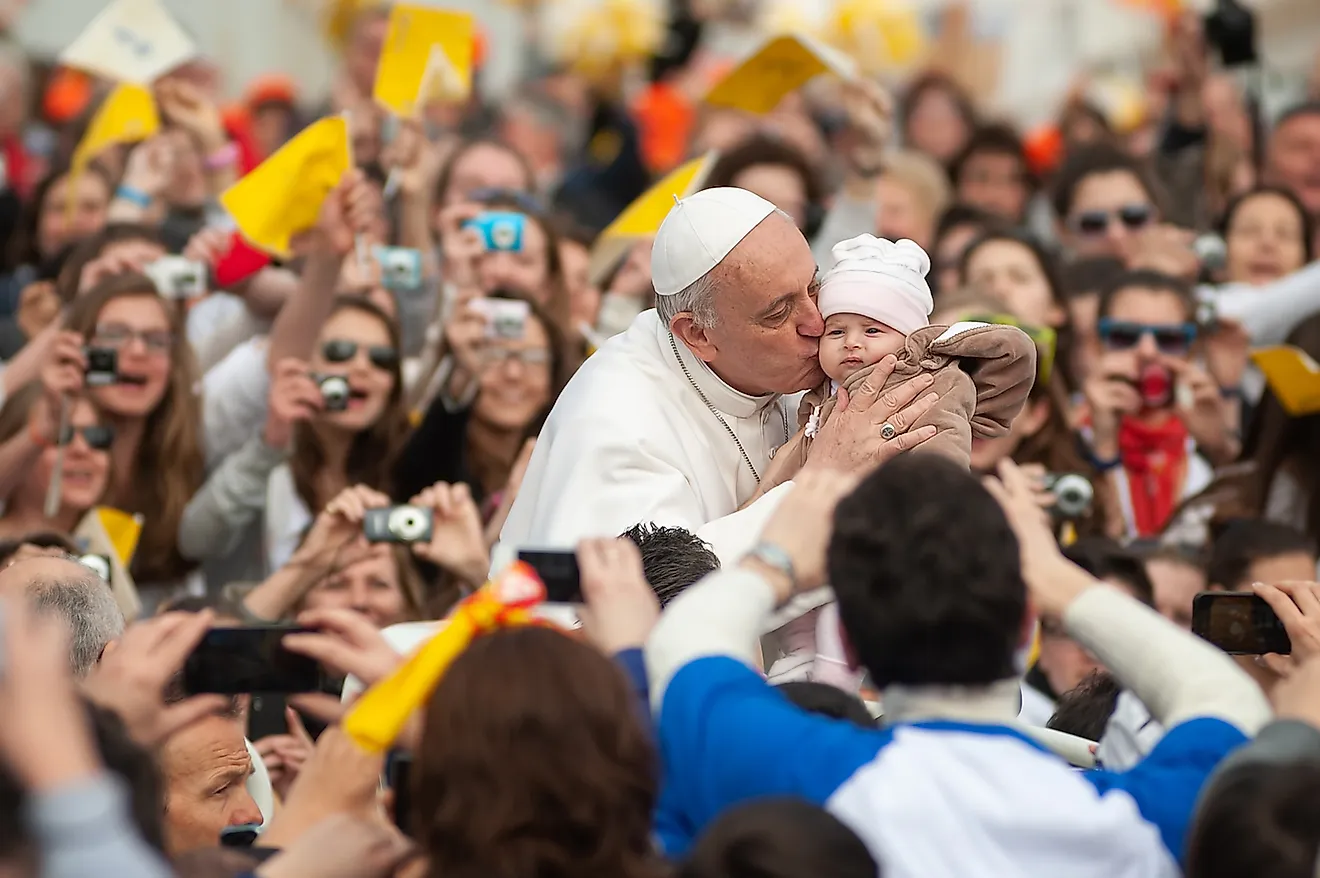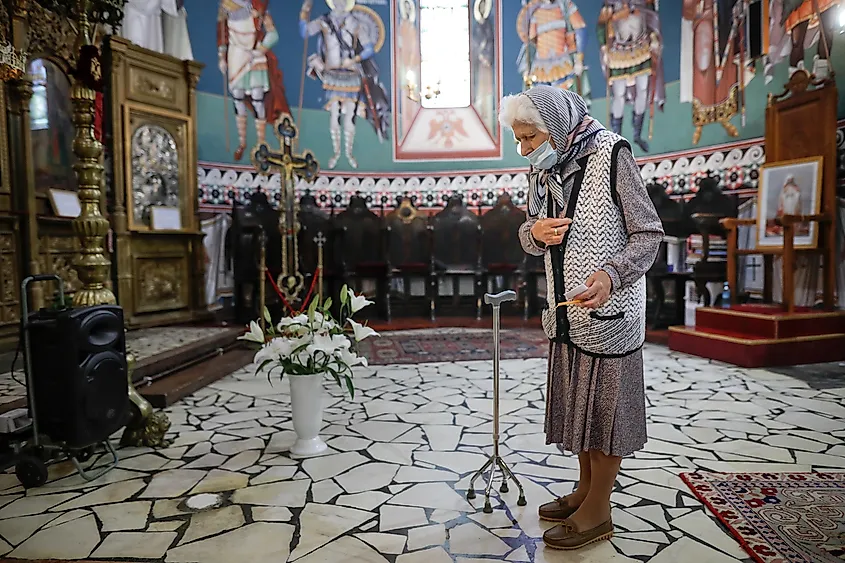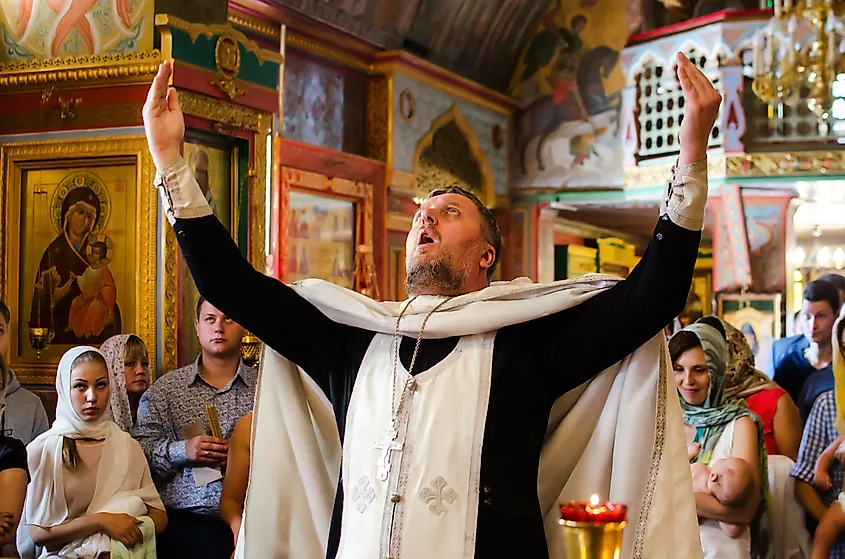European Countries With The Greatest Share Of Christians In The Population

- In 2010, the European countries with an overwhelming majority of self-professed Christians included Vatican City, Romania, the Faroe Islands, Moldova, Malta, Iceland, Poland, Croatia, Serbia, and Ireland.
- In Eastern Europe an overwhelming majority of people describe themselves as Orthodox Christians or Catholics, but very few attend church regularly.
- The number of people describing themselves as Christian in the UK and France is expected to drop dramatically to below 50% by 2050.
Christianity has been around for thousands of years, and it has become quite popular, to be subtle. Christians now form the world’s largest religious group, taking up about 31% of the Earth’s population. Where the largest groups of followers are living has been changing in recent times, however. Young people in places like North America and Europe-traditional strongholds of Christianity-are attending church in fewer numbers, and describing themselves as Christians less and less. In places like Africa, Asia, and South America, however, more people are deciding to follow the Christian religion.
Like most religions, Christianity has a long history. Christ’s first followers spread Christianity in its infancy throughout the Middle East, along the Mediterranean Sea, and into the Roman Empire. The Romans did not immediately look favorably on the religion however, and practicing Christianity was illegal in Roman occupied territories for some time. By the year 301 AD, however, Christianity became the state religion in Armenia, and this started its spread in Europe as an official religion, barring a few bumps in the road. Romans soon came to see Christianity as a useful tool for connecting with their people.
Christianity In Europe Today

Is Christianity still thriving today in Europe? Yes and no. Christianity is still the dominant religion in Europe. The number of people who call themselves Christians has been going down generally across the continent however, while people are following other religions like Islam, in greater numbers.
In 2010, the European countries with an overwhelming majority of self-professed Christians included Vatican City, Romania, the Faroe Islands, Moldova, Malta, Iceland, Poland, Croatia, Serbia, and Ireland. These were the top 10 countries in Europe with the greatest share of Christians in their population according to Pew Research Center.
Western Europe

Not all Christians in Europe are what you might picture them to be, however. Research shows the majority of Christians in Western Europe are now non-practicing, meaning they do not go to church regularly. Most of these people are baptized (91%), and raised as Christians, but only about 22% of them attend church on a monthly basis or more. In fact, most self-described Christians in Western Europe attend church just a few times per year, likely for big celebrations like Christmas and Easter.
What is also of note is the fact that most people in this group say they believe in God or a higher power, but not necessarily as is described in the Bible.
Some of the negatives of following organized religion persist. Of the people surveyed by Pew Research Center, those who identified as Christian in Europe, practicing or non-practicing, were more likely to be less open minded towards immigrants and people of other faiths. These people were also more likely to express feelings of nationalism, for better or for worse.
Eastern Europe

What about central and Eastern Europe? Here, very solid majorities of people say they believe in God. Most align themselves with either Orthodox Christianity or Catholicism, in majorities above 70%. In some places like Russia and Poland, following these religions is regarded as a necessity by most. Or, at least saying you follow these religions is important. Research shows being an Orthodox Christian or a Catholic there is tightly entwined with being seen as a “true Russian” or a “true Pole”.
In contrast to this, however, most people in eastern Europe do not actually attend church regularly, however. Why make so much noise about religion, then? Some say the zeal for religious identity in eastern Europe could be the result of communist regimes once oppressing religion and promoting atheism there. Once communism fell, people retaliated by being able to express their new-found religious freedom, even if they didn’t have time to attend church. To this day, it seems it is the idea of religion and choice that matters.
The Scene In 2050
What will Christianity look like across Europe by the year 2050? There will be some big changes. Those countries with large majorities of Christians, such as those in the top ten list above, are predicted to stay largely the same. And some countries are predicted to see a drop in Christians by about 5% to 6% by the year 2050, but nothing major.
Other countries in Europe with smaller majorities of Christians are expected to see more dramatic decreases in followers. These include places like the UK, France, and Macedonia. In 2010, about 64% of people in the UK were Christian, for example. By the year 2050 however, analysts are expecting this to fall to about 45%. In France, about 63% of people described themselves as Christian in 2010, and this is expected to fall to 43% by 2050. In Macedonia, the numbers of Christians are predicted to fall from 59% to 42%.
Reasons For Decreases In Followers

Why are people moving away from the church? One reason for the drop in parts of Europe is that people who describe themselves as Christian but who do not really practice the religion are not raising their children as religious. As such, when their children grow to adulthood, they are expected to be atheists, and not religious followers of any kind.
There are other factors, too. Increasingly, reports indicate that people in places like the UK are viewing Christianity as a false source of authority, and part of an old-fashioned empire. Churches there are no longer supplying social services to the public as they once did, and this is changing people’s attitudes towards religion.
That coupled with corruption and allegations of abuse within the organized religion, as well as the rise of appreciation for scientific thought is considered by some to be contributing to the increase in secularism in these areas. Whether Christian churches and organizations can regain their followers in the decades to come remains to be played out. What will happen depends on many sociological factors, and how people will respond to them.
European Countries With The Greatest Share Of Christians In The Population
| Rank | Country | Christians as % of population in 2010 | Country | Christians as % of population in 2050 (projected value) |
|---|---|---|---|---|
| 1 | Vatican City | > 99.9% | Vatican City | > 99.9% |
| 2 | Romania | 99.5% | Romania | 99.4% |
| 3 | Faeroe Islands | 98.0% | Faeroe Islands | 98.0% |
| 4 | Moldova | 97.4% | Malta | 97.0% |
| 5 | Malta | 97.0% | Moldova | 97.0% |
| 6 | Iceland | 95.0% | Croatia | 93.6% |
| 7 | Poland | 94.3% | Liechtenstein | 91.9% |
| 8 | Croatia | 93.4% | San Marino | 91.6% |
| 9 | Serbia | 92.6% | Lithuania | 91.2% |
| 10 | Ireland | 92.0% | Iceland | 90.8% |
| 11 | Liechtenstein | 91.9% | Andorra | 89.5% |
| 12 | Portugal | 91.9% | Ukraine | 89.2% |
| 13 | San Marino | 91.6% | Gibraltar | 88.8% |
| 14 | Lithuania | 89.8% | Serbia | 88.4% |
| 15 | Andorra | 89.5% | Poland | 86.8% |
| 16 | Gibraltar | 88.8% | Portugal | 86.3% |
| 17 | Georgia | 88.5% | Greece | 86.1% |
| 18 | Greece | 88.1% | Monaco | 86.0% |
| 19 | Monaco | 86.0% | Channel Islands | 85.2% |
| 20 | Slovakia | 85.3% | Georgia | 85.0% |
| 21 | Channel Islands | 85.2% | Isle of Man | 84.1% |
| 22 | Norway | 84.7% | Ireland | 83.5% |
| 23 | Isle of Man | 84.1% | Slovakia | 79.5% |
| 24 | Ukraine | 83.8% | Bulgaria | 78.7% |
| 25 | Denmark | 83.5% | Denmark | 78.6% |
| 26 | Italy | 83.3% | Hungary | 76.1% |
| 27 | Bulgaria | 82.1% | Slovenia | 75.0% |
| 28 | Hungary | 81.0% | Norway | 73.7% |
| 29 | Austria | 80.4% | Italy | 72.8% |
| 30 | Finland | 80.1% | Austria | 72.6% |
| 31 | Spain | 78.6% | Finland | 72.5% |
| 32 | Slovenia | 78.4% | Montenegro | 71.5% |
| 33 | Montenegro | 78.1% | Russia | 71.3% |
| 34 | Europe (All) | 74.5% | Belarus | 71.2% |
| 35 | Russia | 73.3% | Luxembourg | 71.1% |
| 36 | Switzerland | 72.7% | Europe (All) | 65.2% |
| 37 | Belarus | 71.2% | Spain | 65.2% |
| 38 | Luxembourg | 70.4% | Switzerland | 61.9% |
| 39 | Germany | 68.7% | Germany | 59.3% |
| 40 | Sweden | 67.2% | Latvia | 54.3% |
| 41 | United Kingdom | 64.3% | Belgium | 52.8% |
| 42 | Belgium | 64.2% | Sweden | 52.3% |
| 43 | France | 63.0% | Bosnia-Herzegovina | 48.5% |
| 44 | Republic of Macedonia | 59.3% | United Kingdom | 45.4% |
| 45 | Latvia | 55.8% | France | 43.1% |
| 46 | Bosnia-Herzegovina | 52.3% | Republic of Macedonia | 42.7% |
| 47 | Netherlands | 50.6% | Estonia | 40.4% |
| 48 | Estonia | 39.9% | Netherlands | 39.6% |
| 49 | Czech Republic | 23.3% | Czech Republic | 18.6% |
| 50 | Albania | 18.0% | Albania | 13.4% |
| 51 | Kosovo | 6.1% | Kosovo | 4.7% |











